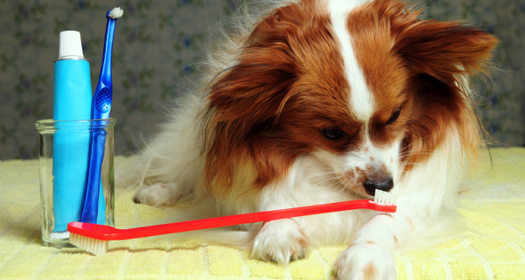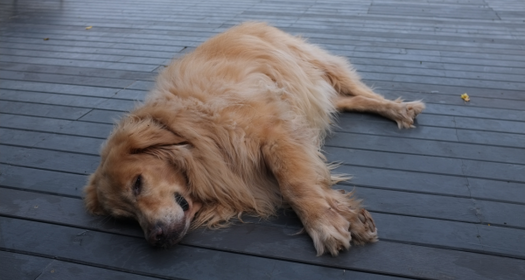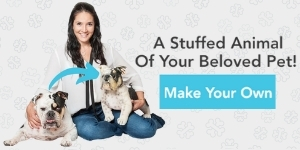
By Dr. Ed Layt - Wishart Rd Veterinary Surgery
and
by Dr John F Newell B.V.Sc.
and
by David Doig, owner of Benson
As published in The Pet Directory
The following notes should answer most of the questions you may have about the care and feeding of you new pup.
Vaccinations
To protect against potentially fatal viruses and bacteria three (3) injections are needed at:
• 6 – 8 weeks of age with C3 to protect against Distemper, Hepatitis and Parvo.
• 12 – 14 weeks of age with C5 which protects against Distemper, Hepatitis Parvo and Kennel Cough.
• 16 – 18 weeks of age with C5
Pups are not fully protected until they have had their third vaccination, so public places should be avoided until after the vaccination at 16 – 18 weeks of age.
Heartworm Prevention
Heartworm is spread by mosquitoes. Heartworm disease can be fatal so prevention is essential and should be started once a pup has been weaned.
We recommend the following products which are dosed according to weight and given monthly.
• Interceptor Tablets
Protects against heartworm, roundworm, whipworm, and hook worm. With separate tapeworm tablets every 3 months, all major worm parasites are treated.
• Sentinel Tablets
Combination of Interceptor and Program. I.e. controls heartworm, roundworm, hookworm, whipworm and prevents flea eggs from hatching. As with interceptor, separate tapeworm treatment is needed every 3 months.
• Heartgard Tables or Chews
Controls heartworm only. Use Drontal for intestinal worm control in combination.
• Advantage DUO
A monthly application of a liquid to the skin on top of the dog’s neck. Also kills fleas. This product is excellent for those owners who find it difficult to give tablets.
Intestinal Worms
Roundworm, hookworm, and tapeworm. Most pups have worms and can reinfect themselves from their faeces, so regular worming and disposal of droppings is important.
If your pup is on daily heartworm tablets or Heartgard you will need to use an all-wormer at these times:
• 2 – 12 weeks every 2 weeks
• 12 weeks – 6 months every month
• then every 3 months as an adult dog
If your pup is on Interceptor or Sentinel for heartworm prevention, a tapeworm treatment is required every 3 months. This can be done with specific tapewormers or all wormers can be used.
Desexing
Female from 6 months of age and not when in season. Males from 6 months of age. This is a surgical procedure requiring a general anaesthetic and a full days stay in hospital. Bookings are best made a week or two beforehand. Do not feed your dog on the morning of the operation and ensure that your dog is clean and free of fleas.
Feeding
At first your pup should be fed exactly as he was before you acquired him. This will ensure he has no tummy upsets due to a change in diet. Over time you may change the diet to suit you, remembering that all food changes should be made gradually and in small amounts.
If your pup develops diarrhoea and otherwise seems well, the best approach is to withhold food for 12 hours, only giving water during this time. Re-start feeding with lean fresh meat only for 24-48 hours. If diarrhoea persists or vomiting occurs, consult your veterinarian. Otherwise gradually reintroduce the normal diet. To ensure the pup receives a balanced diet, it is best that his daily food consists of at least 2/3 dry food. The other third of his diet may include canned food, meat, table scraps, vegetables or egg yolks, and a raw meaty bone once or twice a week (e.g. brisket bones, lamb shanks and beef necks)
With a good balanced diet such as suggested above milk and supplements are not required.
Orphaned Puppies
Orphaned puppies present a special challenge that will consume many weeks of your time if you are to be successful in rearing an orphan litter. You must assume the role of rearing the litter if the bitch is not producing milk or has rejected the litter or even died during the birth process.
For success you must be aware of the many duties performed by a bitch. Not only does she provide nutrition for the puppies but most bitches will naturally initiate the weaning process. Her body heat provides warmth for the puppies as their thermoregulation ability becomes competent. Initially her milk has provided colostrum which helps prevent disease. Its absorption is critical in the first 12 hours when these large molecules are able to be absorbed into the puppy’s intestinal lining.
Her behaviour constantly stimulates the pups – keeps them active and initiates communication and socialization. And of course she is constantly cleaning her brood thereby stimulating normal bowel and bladder function.So it’s not just a matter of assuming her role of feeding the litter!

You will need to ensure
• Nutrition is regularly provided of the correct type and temperature and feed frequency – Bottle or Tube feeding?
• Bowel & Bladder Movements need to be stimulated
You can use a warm moistened cotton wool ball rather than a cotton bud and ensure defeacation occurs. If not you should note which pups haven’t passed a bowel motion or urinated and make sure this occurs at the next feed. You may have to continue this stimulation for 2 – 3 weeks until muscle control develops to initiate voluntary urination and defaecation.
• Warmth needs to be provided as there is no thermoregulation ability with the new born and because of lack of toned muscle development they cannot shiver. There are many satisfactory ways of providing a stable warmth source.
You may use:
• a heat lamp – care not to overheat
• a water bottle – soon goes cold and may be difficult to maintain correct heat
• a heating pad – good but ensure there is no loss of power supply overnight which could chill the litter
• Stimulation and later play initiation are important aspects of orphaned puppy management.
In the early stages it is important to cuddle the puppies and provide verbal and tactile stimulation. As they grow they will instinctively provide interaction with each other but in the first 3 weeks this external stimulation is essential. Sleep patterns need to be recognised. The need for regular routines Is essential and this usually means keeping the children away just because they want to play with the puppies. Wait until they are awake and such careful handling by children assists greatly in the general stimulation of the puppies and their behavioural development.
A Story About Benson The Pup
It’s the lead up to Christmas… you’re feeling overwhelmed with the hustle and bustle of the festive season… and there it is in the pet store, the most enchanting puppy you’ve ever seen.
It looks up at you with needy eyes… it’s soooooo cute…. it’s only small after all…. you have a yard these days…. you can afford it …. you’re gone !!!
DO YOU REALLY KNOW WHAT YOU’RE IN FOR?
Puppies destroy – it's in their nature.
Before you know it, your sofa is shredded, Grandma's vase is smashed and finding a pair of intact shoes is impossible. Time to put the little angel outside. Plants to chew, holes to be dug, fences to be scaled…and lots of barking. Before you know it, your landscaped courtyard looks like a war zone and the neighbors are scowling at you.

And don't forget the costs - desexing, vaccination, registration, training, replacing what’s been destroyed – my, the credit card’s had some use lately. Don't worry, 12-18 months and things will settle down. Unfortunately there is another, much more sinister ‘cost’. What do you think happened to the rest of the litter? The ones that didn’t sell? Did you know that many pet stores have a kill policy?
And those that went to less understanding homes?
Benson was bought from a pet store as a gorgeous puppy. Benson was ‘naughty’ and started chewing so it wasn’t long until he was banished to the yard. He grew up alone and lonely being regularly beaten for his ‘disobedience’.
He loved the children, but Dad had encouraged him to jump up and weighing 50kg, he was flattening them. Finally, Mum put her foot down and he had to go. Benson was literally dumped in the bush !!
He was picked up as a stray and held at a pound. Don’t think Benson is an isolated case. Last year the RSPCA alone put down 85,000 unwanted dogs.
The rescue agency Paws N Hooves (NSW) tried desperately to home him, but being large, untrained and very frightened it was hard to find the right home.
A foster carer finally came forward on his last day and he is now in a very loving home.
YOU COULD BE THE SAVIOUR OF ANOTHER BENSON !!!
There are so many good reasons to save a rescue dog.
You are saving a life. It reduces demand in stores. You can pick the age so if you are not up for the puppy destruction phase, choose an adult… in this case you can also be sure they won’t grow into a small horse.
All rescue dogs are health-checked so you are not going to later discover some hideously expensive disease.
You may never know your pets’ exact breeding but dog owners love guessing and it’s a great ice-breaker – might be the only way you ever get to talk to the friendly neighbor who walks the Staffy past your place each day.

Pounds and rescue agencies get discount rates with vets and usually only try to recover costs… so your mutt is going to cost you a lot less… and it’s all done for you.
While you can buy direct from a pound or shelter, return / refund policies vary so check this out first. If you want to play it safe, go through a rescue agency and ask for a trial period.
There are specialist agencies for various breeds, small dogs, large dogs and some have all sorts. The rescue agencies carefully select dogs with excellent temperaments that are scheduled to be destroyed. Their foster carers often will train them while all the vet work done. The adoption fee is the all-inclusive price and trial periods are encouraged.
Expect to be questioned thoroughly about your motives and knowledge before being matched with your new best friend. So, take a deep breath, walk away from that puppy in the window and think about giving a rescue dog a second chance.











Leave Comment Below